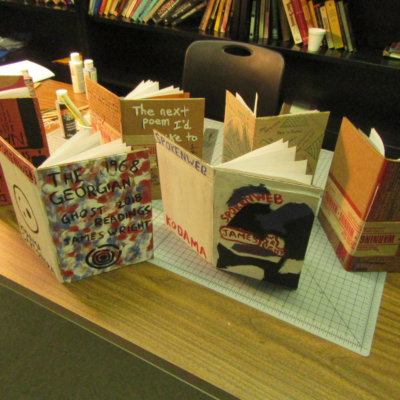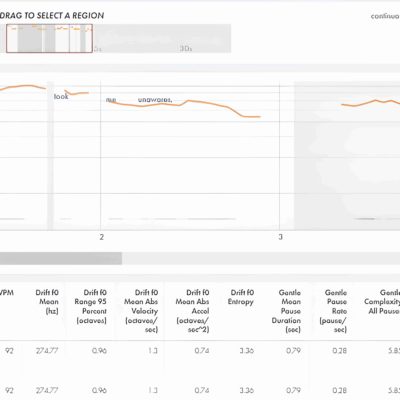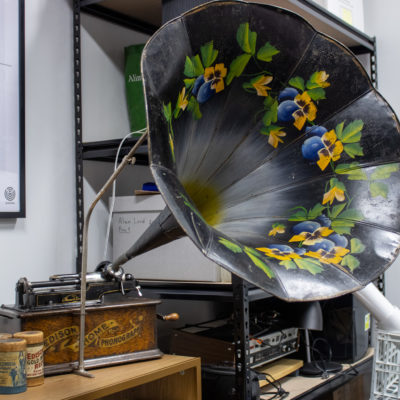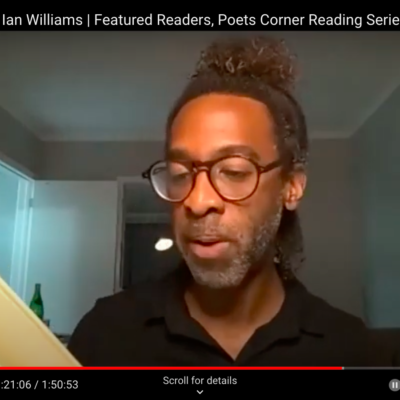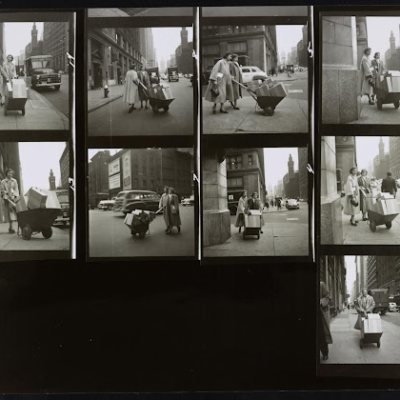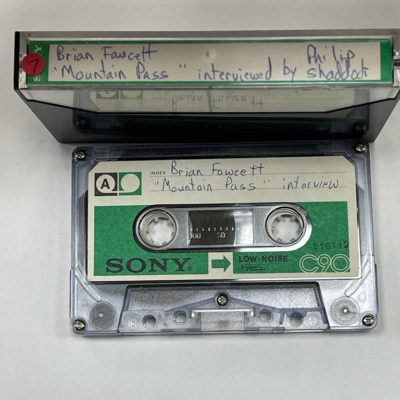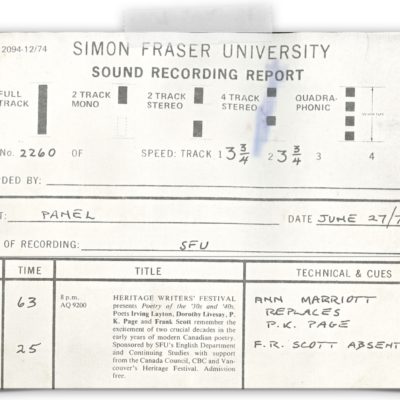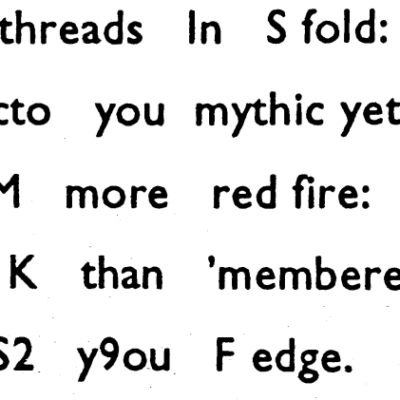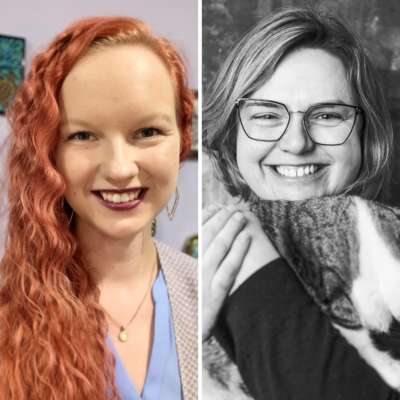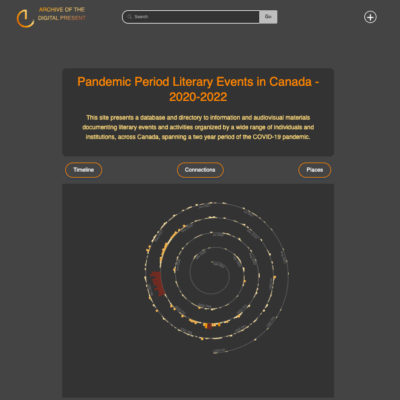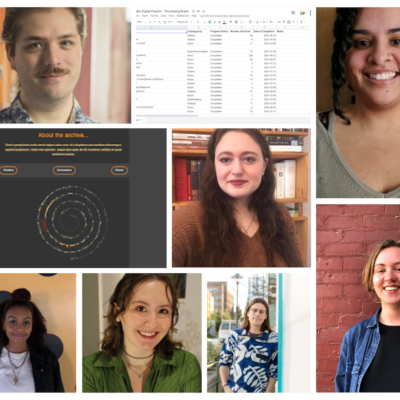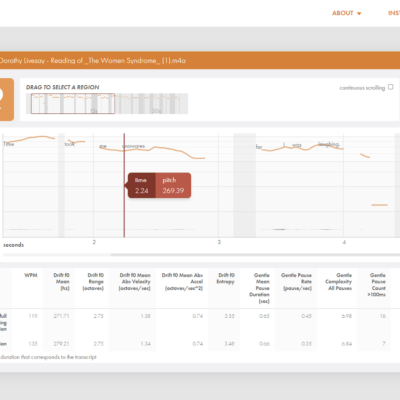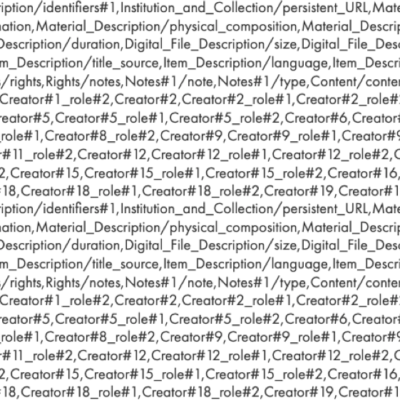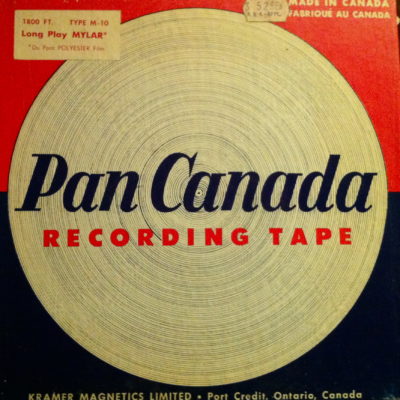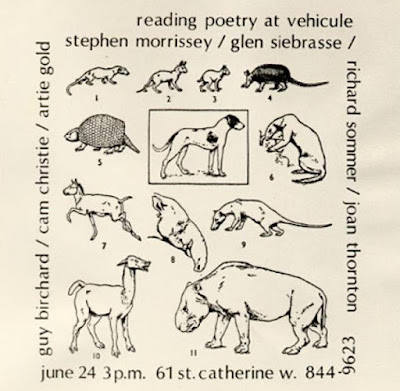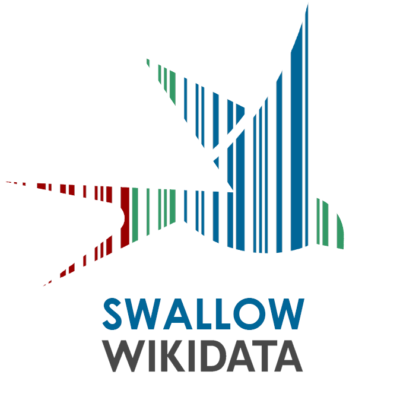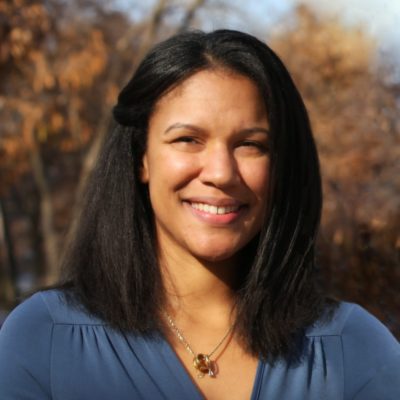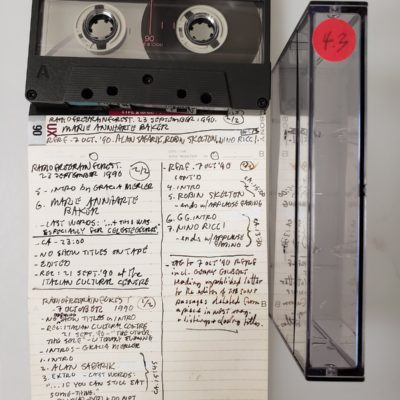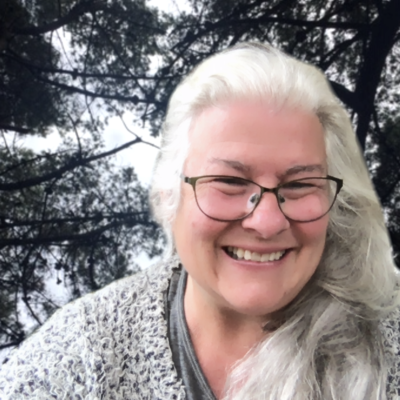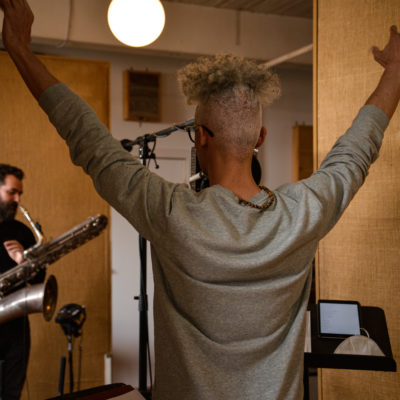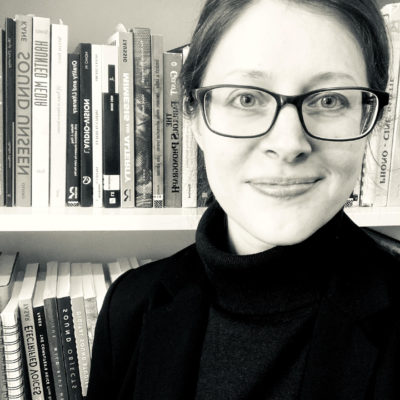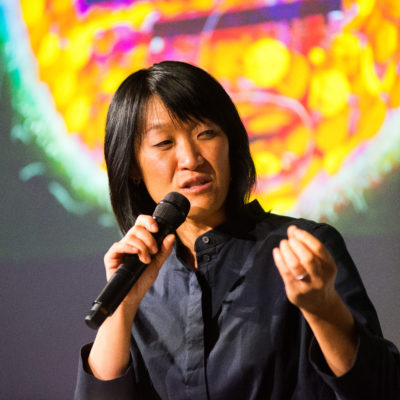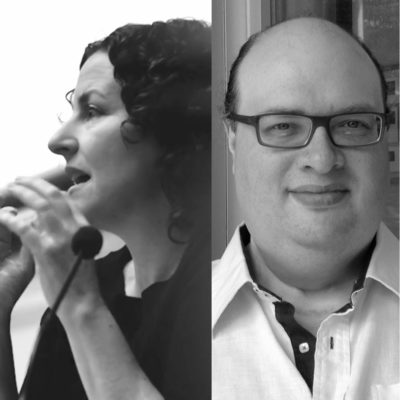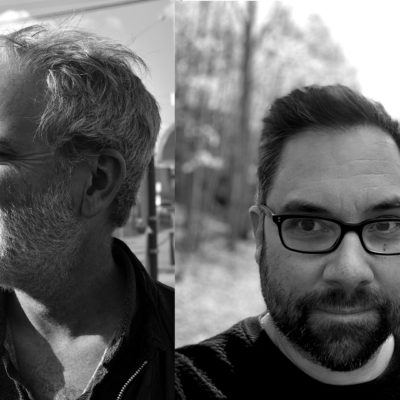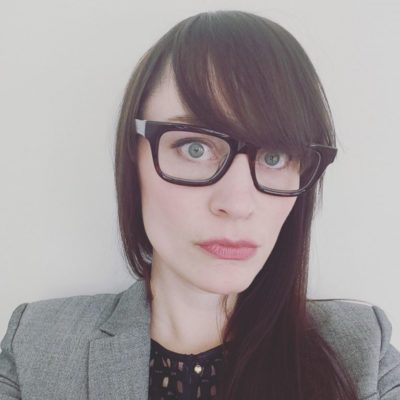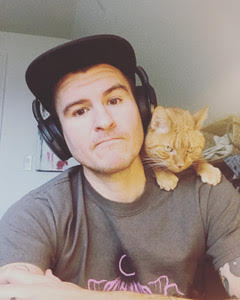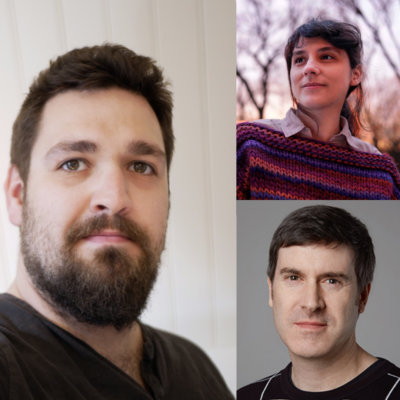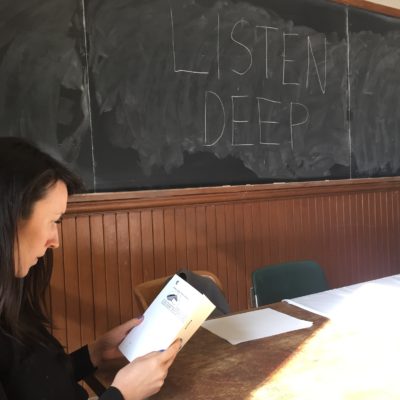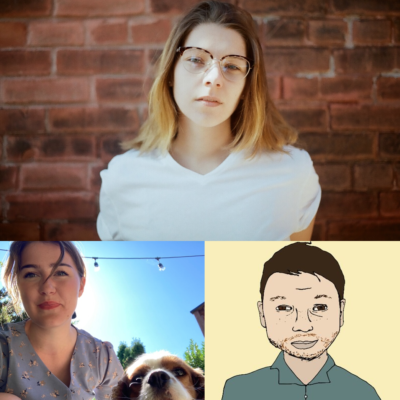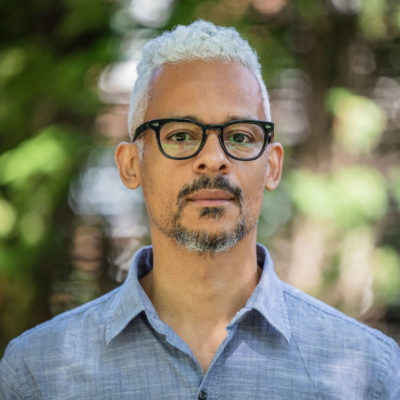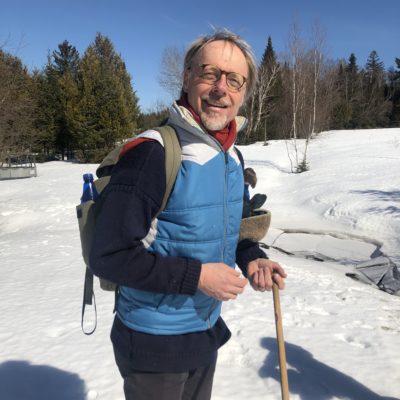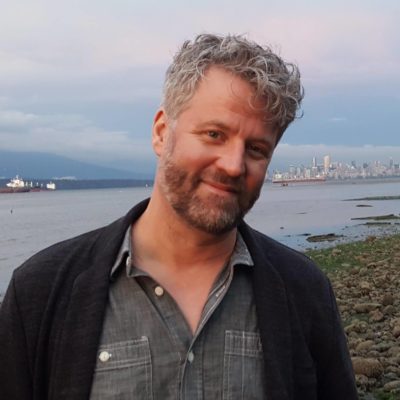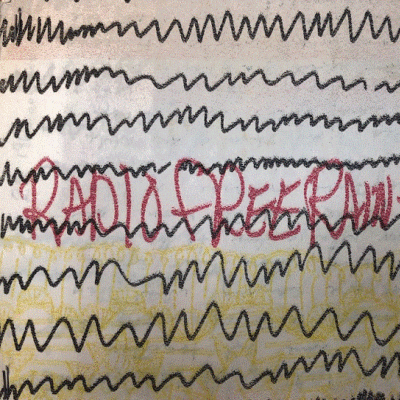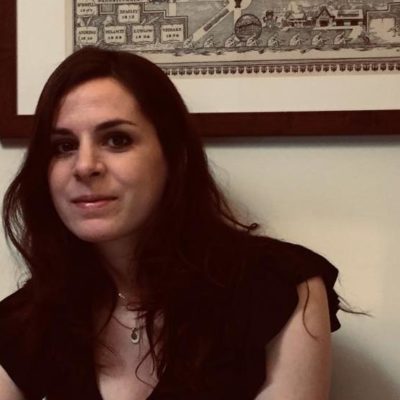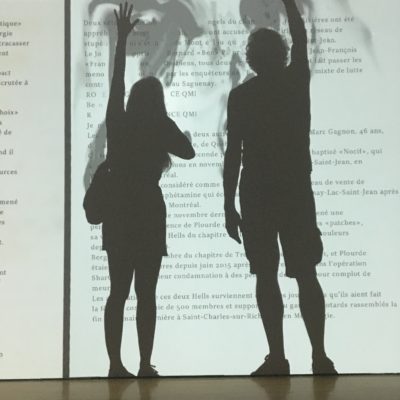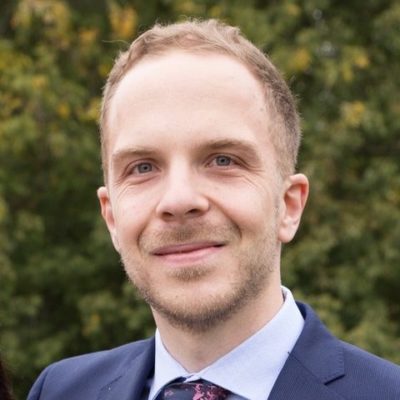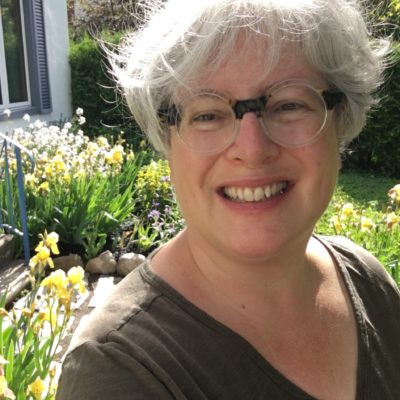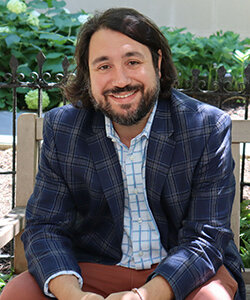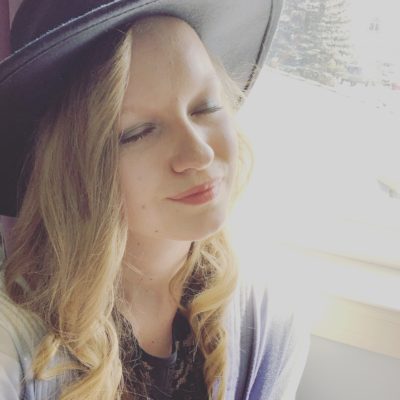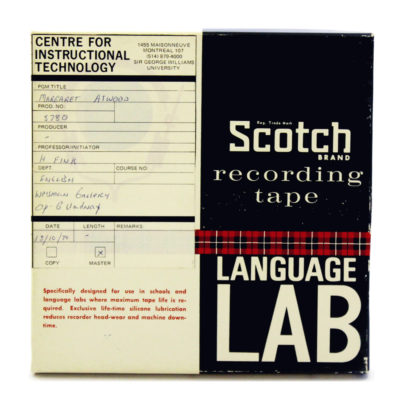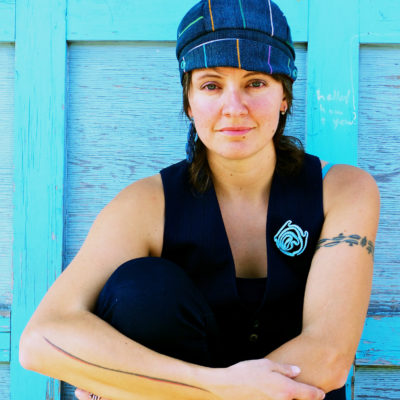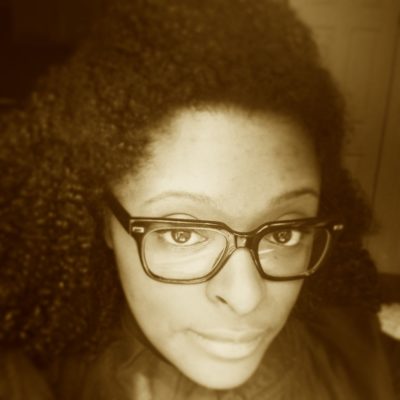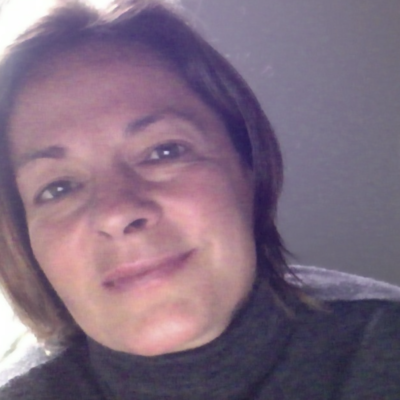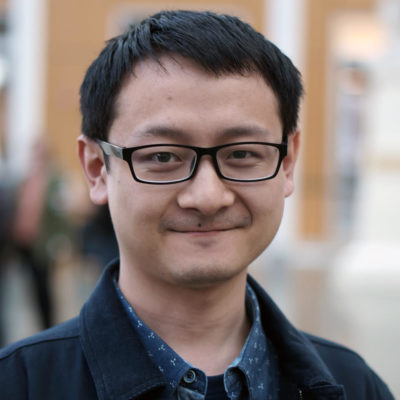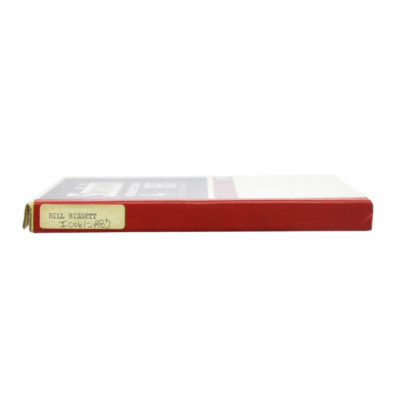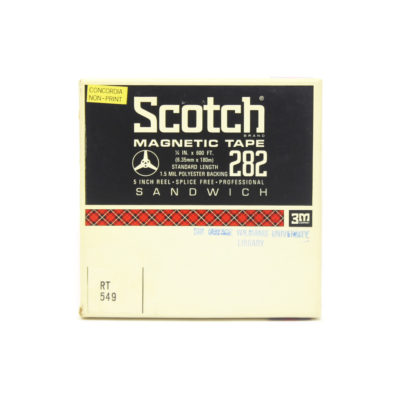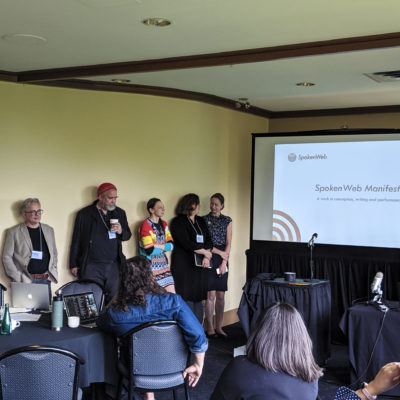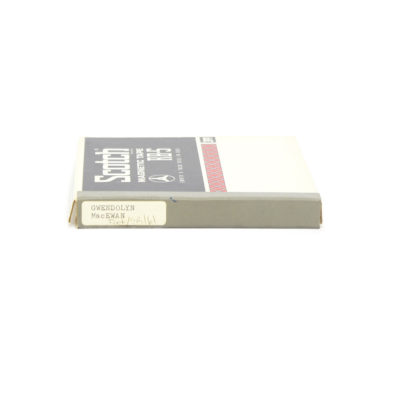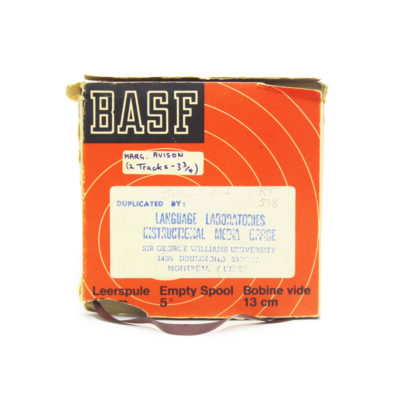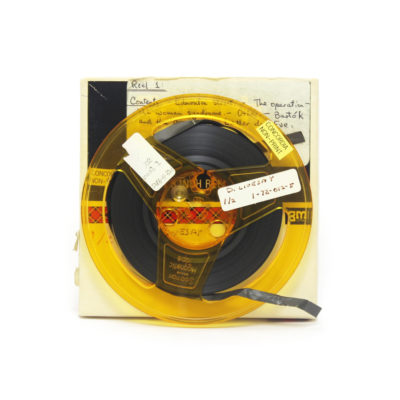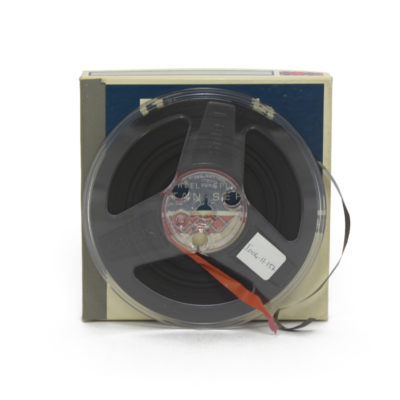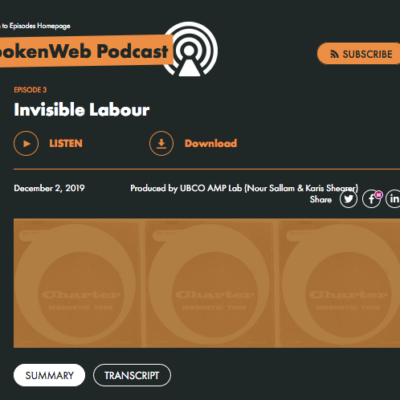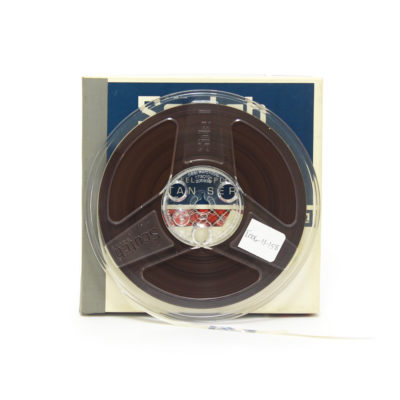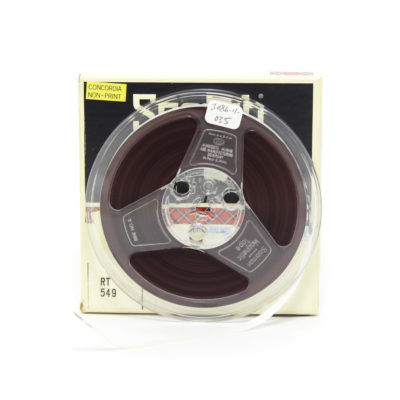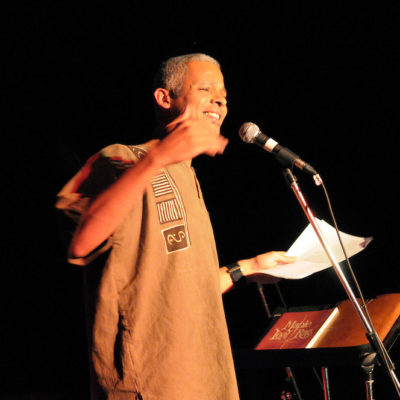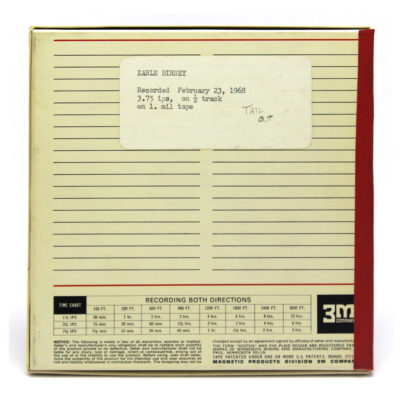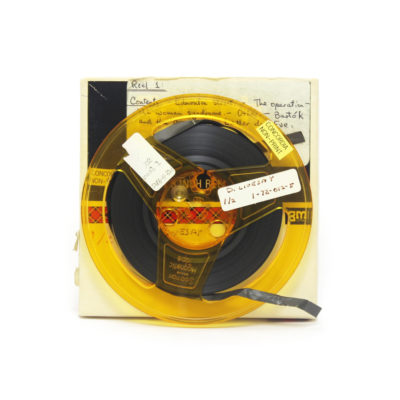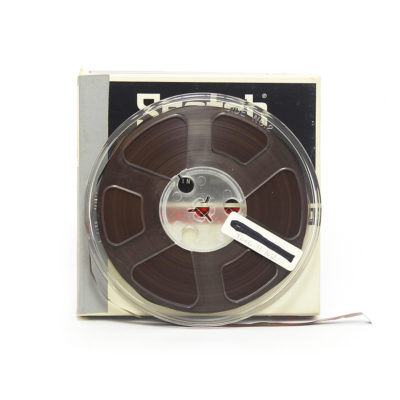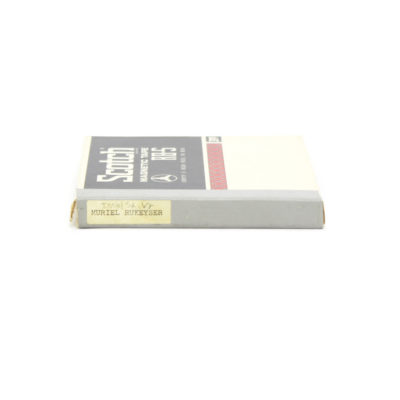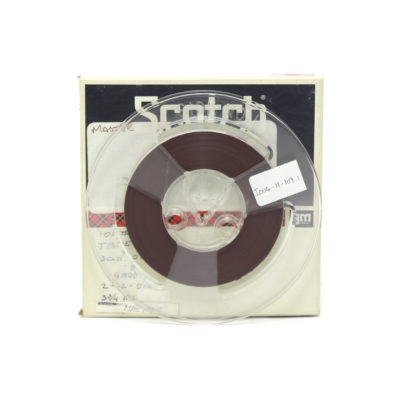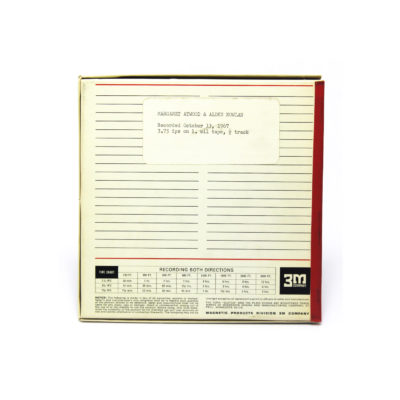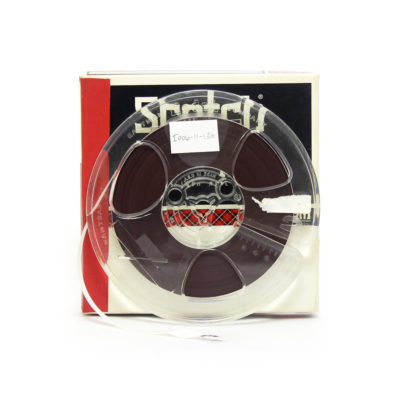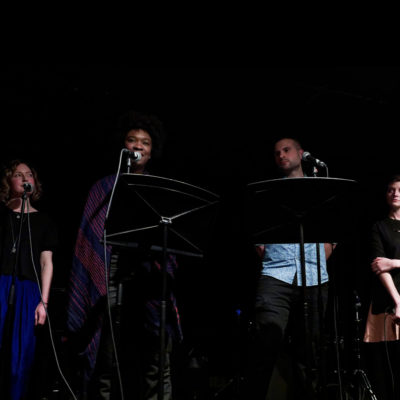The ghost in the archives.
Featured Post
Listening to Listening: Stories of SpokenWeb Ghost Readings
October 2, 2025
Katherine McLeod
The ghost in the archives.
Editor’s note: This blog post provides a series of updates about Drift4, a pitch-tracking software available on the SpokenWeb website.You can read more about how Drift4 works in this previous blog post, and you can access Drift4 through the SpokenWeb Research Tools page here. Major updates have arrived to Drift4 since its release in 2022 […]
SpokenWeb’s AMPLab is located on the sixth floor of Concordia University’s library building, just off a narrow corridor in the heart of the English Department. It is a unique space dedicated to the practice of literary sound studies, housing an impressive collection of audio-related equipment, from turntables and mixers to microphones, vintage reel-to-reel tape machines, […]
On July 6, 2021, the Poets Corner Reading Series held an event on Zoom featuring poets Ian Williams and Jane Munro hosted by Adrienne Drobnies. After Drobnies reads Williams’s bio, Williams says, “Muted now how about now can you hear me now? I still can’t see you, only your name. Your voice is breaking up” (“Jane […]
As part of The Tape Box series, Maya Schwartz undertakes a close listening to a rare series of photographs that are part of a larger story of audio recordings and of collaboration.
While inputting metadata as part of my RA work for Simon Fraser University’s SpokenWeb team, there was one tape that I kept coming back to. The tape is a recording of poet Brian Fawcett reading and being interviewed for the radio program Mountain Pass. After returning to this recording again and again, I decided […]
How might a public dialogue between three modernist poets in 1978—about poetry written in the 1930s and 1940s—remain relevant to thinking about the conditions of Canadian literature today? Dorothy Livesay, Anne Marriott, and Irving Layton, as we have explored in Take 1 and Take 2, examine the shifting relationships between politics, nation, and poetry that are foundational to understandings of what constitutes ‘modernism’ in Canada during these periods.
This post is the second of a three-part series by Teddie Brock, all based on a 1978 panel discussion with Dorothy Livesay, Anne Marriott, and Irving Layton, as recorded on audio preserved at the Simon Fraser University Archives. Check back on SPOKENWEBLOG for the next installment of this close listening to the archives as they […]
Dear Brian, So, I hear you’re the data expert? Well, I’ve got a conundrum for you. As an RA for SpokenWeb, we’re often working with disorganized, unlabelled, and sometimes incomplete archival collections. Take, for instance, the Alan Lord Collection we are currently working on. For context, this collection includes AV materials from Ultimatum [1] and […]
LIVESAY: “But in the 30s there were absolutely no readings… I—we were much too embarrassed or shy even to read to each other. Everything was the printed word. And that is why the magazine was such an important thing… Poets were working together to produce a magazine, and to try and get an audience for […]
Abstract Launched in 2005 and rebooted in 2022, the Fred Wah Digital Archive is a digital web project that intends to act as a living archive of the work of Fred Wah, including a new interview with the author. As a consequence of the poet’s interest in the sonic and phonetic aspects of language, the […]
ShortCuts on SPOKENWEBLOG is a series of critical commentaries about short clips selected from audio collections across the SpokenWeb network. This post introduces a three-part series by Teddie Brock, all based on a 1978 panel discussion with Dorothy Livesay, Anne Marriott, and Irving Layton, as recorded on audio preserved at the Simon Fraser University Archives. […]
I first met Annie Murray in 2017 at a job interview (she was the interviewer, I the interviewee—thankfully I got the job), and in 2018 Annie asked me to join the SpokenWeb team as a research assistant. Four years later, we sit down—through our respective laptops—to chat about all things audio. As I soon found […]
To find the website discussed in this article please visit the Archive of the Digital Present. To read about how the data for this project was collected, see “A Conversation Among Cataloguers: Processes and Personal Reflections on Data Collection” published on the SWB. Introduction The way literary readings, talks, interviews, podcasts, book launches, and other […]
Introduction Jason Camlot (Professor in the Department of English, Research Chair in Literature and Sound Studies at Concordia University) Since 2016, the “Where Poets Read” online listing of literary events in Montreal has posted details of nearly 800 readings.[1] The last “live” in-person event listed on the site (until recently) was for the Épiques Voices: […]
Introduction Drift is a highly accurate pitch-tracker prototyped in 2016 by Robert Ochshorn and Max Hawkins. Its further development has been supported by a NEH Digital Humanities Advancement grant and now by SpokenWeb. At UC Davis, undergraduate research assistants Sarah Yuniar and Hannan Waliullah, working with Marit MacArthur and Lee M. Miller, have beautifully improved […]
Ask Brian McFee is a new regular column in which letters sent by members across the SpokenWeb network concerning the digital analysis of sound are answered by our resident computational audio expert, Brian McFee (NYU). Do you have a question about how we can use computers to analyze sound? Send them to the SWB editorial […]
Figure 1. Open Refine GUI. Explaining the Case and Software Tool In 2019, SpokenWeb SFU Project Manager Cole Mash (SFU) and SpokenWeb Systems Task Force member Tomasz Neugebauer (Concordia) began work on editing SWALLOW entries. SWALLOW is an open-source metadata ingestion system developed by the SpokenWeb team to describe and manage the project’s object of […]
Introduction This article emerged from the “feminist close listening” methodology we devised together during a collaborative listening session in Montreal, December, 2017. We began the practice of listening to recordings together, in real time, as a way of attuning ourselves to the related inquiries that our archives of interest shared. For Karis, this archive is […]
How to introduce an introduction. How to warm the stage for the dates, facts, and anecdotes that are already presented in Stephen Morrissey’s reminiscences about Véhicule Art Inc. as an experimental forum for the performance of new poetry, in the 1970s, in Montreal. The Véhicule Poets—again, see post below for the who’s who—have maintained a […]
Linked data has been a part of Swallow and the SpokenWeb Metadata Schema since its conception. The goal is to be able eventually to expose records in linked data format.¹ We envision that this will make the collections processed by our team more visible in the long term, while allowing novel research opportunities. To achieve […]
In this ShortCuts blog post, podcast producers Kate Moffatt, Kandice Sharren, and Michelle Levy have selected an audio clip from a Mavis Gallant’s reading in which she spontaneously provides contextual information during her reading, and they have reflected upon how the experience of a ‘footnote’ can differ in print and audio formats.
Oral Literary History (OLH) is one of the primary research axes of the SpokenWeb project. This post offers an overview of what we perceive to be unique about OLH as a discipline, with attention to its theoretical underpinnings, ethics, and methods. The SpokenWeb project began conducting Oral History interviews in 2012, with people who participated […]
The virtual panel “Teaching with Sound / Sound and Pedagogy,” as part of SpokenWeb’s Listening, Sound, Agency Symposium, brought together scholars on May 19, 2021, to exchange ideas involving sound within the educational context. One of them was Nicole Brittingham Furlonge, who took from her book Race Sounds to present the paper, “‘New Ways to […]
Clint Burnham, Deanna Fong, Linara Kolosov, and Teddie Brock The following pieces expand upon oral responses given at the SpokenWeb event “From Reel to Reel: Animating the Archive” on February 11, 2021. The cultural object at the heart of this discussion was the poem “Mayakovsky,” performed by the Canadian avant-garde sound collective The Four Horsemen. […]
In a virtual space somewhere between Wellington, New Zealand and Montreal, Canada, Preston and I her discussed work in close relation to the conditions, collaborations and trajectories that make it so. The sound of breath, Scandinavian külning, ventilators, cuckoo-clocks and the body all emerged as conduits. Preston’s investment in situating her work and self-situating within it—locating her projects within their particular connections, collaborations, memories, histories and skills—was inspiring, especially at a time of such fragmentation and disjuncture. Hearing Preston’s voice through a frozen screen, persisting over visual glitches and lagged response, not only affirmed Preston’s assertion that “sound always pierces the visual” but too, that sound is a vital index to the present: “it’s always the now.”
Specially commissioned for the Listening, Sound, Agency Symposium, Griffin-award-winning poet Kaie Kellough, designer and artistic director of LOKI studios Kevin Yuen Kit Lo, and Constellation recording artist and saxophonist Jason Sharp, collaborate on an interdisciplinary work. Long-awaited, Small Stones will premiere tonight, 22 May 2021 and may be watched in the embedded video below. To enhance and support the listening and watching experience, Kaie has generously shared some reflections on the process of creating this work with his collaborators and the meandering iterations of the poem through page, dialogue, and performance.
I was very excited to initiate a conversation with Renée Altergott because her research dovetails with my own in numerous ways. That said, my own research has focused on the history of early sound recording media technologies (and spoken recordings) in Anglo-American contexts, and Renée’s research explores this historical period of the medium in French […]
On Thursday, May 20th, 130-3pm EDT, Nina Sun Eidsheim will deliver a keynote address as part of the 2021 Listening, Sound, Agency symposium. Titled “Re-writing Algorithms for Just Recognition: From Digital Aural Redlining to Accent Activism,” she will argue that “voice- and listening technologies carry and reproduce the same social bias, discrimination, and racism [...] as Kodak film and HP cameras [which] were calibrated for white skin colour.” Elaborating on this important research, Nina generously answered some questions about her current projects and interests, providing poignant backstory to her keynote, and inviting all readers to events at her UCLA PEER Lab in the next weeks and months.
Read and listen to Mara Mills and Jonathan Sterne, in conversation with Mathieu Aubin and Katherine McLeod, discussing their recent publication, “Aural Speed-Reading: Some Historical Bookmarks,” PMLA 135.2 (2020). Mara Mills and Jonathan Sterne are plenary speakers at the SpokenWeb symposium, Listening, Sound, Agency (May 18-23, 2021).
The following is an excerpt from an interview that Dylan Robinson gave for a SFU graduate course taught by SpokenWeb team member Clint Burnham. The full transcript will appear in the forthcoming publication Resistant Practices in Communities of Sound, a collection of critical work and interviews edited by Deanna Fong and Cole Mash. Dr. Robinson will also give a plenary lecture for the upcoming Listening, Sound, Agency Symposium taking place from May 18-23, 2021.
What struck me immediately in my chat with Dr. Julia Polyck-O’Neill is her attentiveness to relationality’s many frequencies. Her writing on conceptualism’s legacies and Canadian avant-garde scenes, particularly the Kootenay School of Writing, is necessitated by relations, whether building trust with her research subjects, or investigating the porousness between media and form in artists’ interdisciplinary practices. I was thrilled to learn more about Julia’s current research on digital and feminist interventions into preservation protocols for artists’ archives, which she is pursuing as a postdoctoral project at York University’s Sensorium Centre. She was generous to share some of her emerging revelations on archival intimacies, like being invited to pore over the private collection of poet Lisa Robertson, and oddities (including an archived pizza box!).
I was excited to talk with Andrew McEwan, whose research on Weiner’s performance of Clairvoyant Journal speaks to these very textual and aural qualities of the work. After speaking with Andrew, I returned to Weiner, listening for what he—provocatively, to use his own terms—theorizes as her "selvesothers." I invite you to do the same and to reflect on how it might shift your reading.
Cet hiver, Stéphanie et Mathieu ont eu le plaisir de discuter avec le groupe de chercheurs et artistes derrière le projet « Auxauralités ». Voici notre entretien avec Georges qui nous parle plus en détail de son travail collaboratif sur les métamatériaux acoustiques. - - This winter, Stéphanie and Mathieu had the pleasure of discussing with the group of researchers and artists behind the "Auxauralités" project. We interviewed Georges to talk in greater detail about his collaborative work on acoustic metamaterials.
Two years ago today, Klara du Plessis and Deanna Fong participated in the event Listen Deep: Poetry, Sound and Multitudinous Remix, curated by Margaret Christakos and hosted at the University of Toronto on 8 March 2019. What follows is a brief description of the event’s activities, and then a transcription of a conversation that they had shortly after the event.
This summer, I reached out to Jentery Sayers with some questions about his research on voice user interfaces. He told me his research had veered in new directions and proposed that we discuss other related projects happening at The University of Victoria, where he teaches, and runs the Praxis Studio for Comparative Media Studies. He suggested I get in touch with Julie Funk and Faith Ryan to learn more about what’s happening at the lab, which I did. Here’s a peek into their innovative work: ‘literary machine listening’ and teaching audio in fiction in the classroom.
Calling Kaie Kellough an ancestral voice is maybe presumptive or even paradoxical, considering the bold aesthetic leaps in his work, and his widening reputation as a necessary innovative voice among a rising generation of writers in Canada. Whether it be in the circuitry between voice, image, and jazz of his collaborative “UBGNLSWRE” with musician and composer Jason Sharp and Kevin Yuen Kit Lo, or in the lyrical torrent of his Magnetic Equator, winner of the Griffin Poetry Prize (McClelland & Stewart, 2019), Kaie’s poiesis is undeniably futurist. It’s from the futurism of his writing, however, that the ancestral surfaces. He is attuned to the frequencies of many Black histories unfolding all at once. The ‘past’ still reverberates with the same intensity. By weaving memoryscapes across continents in Magnetic Equator and the fiction collection Dominoes at the Crossroads (Véhicule, 2020), Kaie’s work splashes in history’s restlessness. History never knocks politely. It seeps in through the floorboards. Kaie is unafraid to go down with its tide.
Back in the summer of 2020, still in the early months of the COVID-19 pandemic and its wide-ranging social restrictions, MA student Andrew Roberge initiated an interview with Listening, Sound, Agency symposium participant, Andre Furlani, whose recent research explores the poetics and politics of ambulation, or, walking. In this interview, learn more about Furlani's research into the relationship between walking and sound, and about his interest in particular kinds of soundwalks. The topic seems especially poignant now, so many months into the pandemic, when walking, and simply being outside and listening, have become cherished activities for much needed sensuous experience, and for our sense of connection to our environments, and to others (even if, at a distance).
Jason Wiens' interest in teaching poetry with sound recordings has led his critical attention back to a tradition of textual analysis that emerged in France in the late 1970s, known as "genetic criticism" (La Critique génétique), with its interest in approaching texts as entities whose emergence is traceable through the study of "avant-texts". In this interview conducted by Jason Camlot, Wiens talks about recent experiments and assignments he has used in teaching Canadian poetry with sound recordings, and explains his interest in genetic criticism as it relates to the study of audiotexts.
As the inaugural ShortCuts blog post, SpokenWeb RA Nina Fesenko selects a clip from Simon Fraser University’s Gerry Gilbert radiofreerainforest Collection and guides listeners through it. While listeners to radiofreerainforest will know that this radio program is no stranger to the bizarre, Gerry Gilbert and Billy Little’s reading of Lewis Carroll’s poem, “You Are Old, Father William,” is a reminder of what makes the bizarre so great...
It seems appropriate that Dr. Katharina Fuerholzer would recommend the soundtrack to the hit series 'The End of the F***ing World', considering the state of the world, but more too, her work on aphasic poetry in Harryette Mullen’s 'Sleeping with the Dictionary'. The songs are fitting— romantic and unnerving— in the way that Mullen’s dictionary— "In the dark night’s insomnia, the book is a stimulating sedative, awakening my tired imagination to the hypnagogic trance of language"—is. Listen to the soundtrack while you read the following interview (and, let it spill into your other work), where I talk to Katharina about aphasic poetry, interdisciplinarity, and the femme aphasique. Here, we consider aphasia's varied metaphoric, medicinal, and literary meanings.
As a video game enthusiast, Ali Barillaro was initially drawn to interview Deanna Fong and Jon Safloske because they had submitted a proposal for the Listening, Sound, Agency Symposium about the dark, fantasy-action adventure game, Hellblade. But when Ali sat down to draft some questions for Deanna and Jon, she found herself curious to hear about how their research partnership began and how it has progressed over the past year. So this interview is as much about how research collaborations develop through shared interests in sound and sound studies methodologies, as it is about their recent work on Hellblade.
As a new member of the SpokenWeb team, I was thrilled to connect with Postdoctoral Fellow and SpokenWeb researcher, Mathieu Aubin, and learn about his work in a more specific context than our weekly meetings. Aubin’s research examines queerness in oral histories and audio recordings of literary events, engaging activist and marginalized voices, content, and […]
Ellen Waterman’s creative and research practices are all about listening together across and through distance and difference. When I spoke with her during our socially distanced summer of the pandemic, I was interested to hear how our current situation has influenced her thinking about what it means to create sound and sound-based work together. What follows is an interview that still attempts to be spontaneous and to listen, even in written form.
In 2018 I had the opportunity to visit one of Chris Mustazza's interdisciplinary literature classes taught at the University of Pennsylvania, a course called Poetry Audio Lab: Modernism & Sound Studies. I was amazed at how seamlessly he had woven questions of poetics, performance, media history, and digital approaches to listening and analysis into his syllabus. As one of the early experimenters in teaching poetry through a major audio poetry archive (PennSound), and as a regular collaborator with Al Filreis, another innovator in this area who draws upon the audio archive in his wide-reaching ModPo MOOC, talking to Chris about teaching proved a unique opportunity to think about rationale, methods and effects of teaching poetry with sound.
In May, I reached out to Leah VanDyk shortly after she was awarded a Killam scholarship for her research in environmental humanities. Having met Leah before and heard her present at the “Text/Sound/Performance” conference in Dublin, Ireland in April 2019, I was excited to catch up with her and hear about her ongoing research. As I quickly found out, while her research focuses on environmental humanities, pedagogy, and accessibility, Leah is also often thinking about serendipitous moments activated through sound.
The audio clip for this Audio of the Week is introduced by SpokenWeb RA Emma Telaro. Read about what caught Emma's attention while she listened to a recording of a reading by Margaret Atwood that took place in a hot and crowded art gallery at Sir George Williams in Montreal on October 18, 1974.
The transition wasn’t gradual; it happened over night. In March 2020, due to the global COVID19 pandemic, university classes and seminars, research meetings, supervisory chats, scholarly conferences, and more, all moved online. Suddenly the screen became the office, the boardroom, and the classroom. Suddenly the screen became the sole mediator of collective thinking, discussing, and sharing of information. While some might argue for the efficacy of this collective move online, Stephen J. Neville—who would have presented at the SpokenWeb Listening, Sound, Agency symposium this July—published early research on the flip side of online videoconferencing, discovering the racist and misogynist underpinning of many so-called Zoom-bombing attacks (co-authored with Prof. Greg Elmer and Anthony Glyn Burton). Here I ask him a few further questions about his latest, highly relevant research.
I’ve been listening to recordings of The Words and Music Show for almost a year now. There are no shortages of standout performances in the collection, but every so often I’ll encounter something that catches me off guard with how much it resonates with the world around me in that moment of discovery.
As sound scholars, we can sometimes take for granted the existence of a sonic trace to blow open our research. However, if you’re working between sound and Black Studies like Dr. Kristin Moriah, Assistant Professor of English at Queen’s University, contending with sonic absence shapes—and often compels—the work. Kristin’s research examines Black performance and recording, spanning from Black feminist political mobilization against lynching in the United States to African-American performers in Berlin during the fin-de-siècle. We discussed the intrinsic relationship between Black activism and Black soundscapes via music, poetics, and oration, and its importance toward liberation during this pertinent contemporary moment.
Situated at the intersection of sound and literature, artist and scholar Dr. Eric Schmaltz exemplifies the flexible thinking proper to such an innovative, interdisciplinary field. Recently, I spoke with Dr. Schmaltz about his upcoming critical work— the radical potential of silence and of body in the formation of a poetics of the ‘unvoice’—and of the sounds, important, informing his recent research activities. Most meaningfully, our conversation speaks to the possibilities inflecting our ever-growing sound studies scape; the connected and vital work of confronting our literary histories.
Finding spaces and opportunities that enable you to make use of all of your skills and experiences in meaningful ways can be a challenge as you navigate academic studies. As such, it's always refreshing to speak with someone like Dr. Teresa Connors who has successfully brought together her artistic vision and creative practice and the world of data and research to create magnificent audiovisual installations.
I reached out to Junting Huang, a Ph.D candidate at Cornell University, in May. Amidst my own encounters with the shifting soundscapes of the pandemic quarantine, I was excited to hear more about his paper, exploring the soundscapes of political unrest in Taiwan. Our correspondence, over numerous emails and international borders, suggests that despite these often isolating circumstances, good conversation persists.
In this week’s Audio of the Week clip from PennSound, a partner affiliate of the SpokenWeb research network, we hear a televised reading of bill bissett chanting and reading from his then upcoming book Sailor (1978) on Vancouver’s CKVU-TV (now CityTV) show “The Vancouver Show” in early September 1978. By listening to the clip, you will gain an aural glimpse into bissett’s life following accusations of pornography against his work in the House of Commons.
Known for their seriality as well as their ability to provide people the freedom to vocalize their thoughts and to directly reach a public, podcasts have changed the way we listen to media since the beginning of the 21st century. While there is a plethora of podcasts available to listeners that are informed by diverse interests such as literature, sports, food, travel, and tabletop role-playing games, what happens when podcast production is deployed as a feminist practice?
I’ve lived in Montreal my whole life, but, sadly, up until last year my experience of Canada beyond my home province consisted only of occasional trips to Ontario. When I found out that SpokenWeb was hosting the 2019 Symposium (Resonant Practices In Communities Of Sound) and the SpokenWeb Sound Institute in Vancouver – and that […]
In this Audio of the Week, you are listening to the voice of poet Gwendolyn MacEwen reading in Montreal on November 18, 1966. The reading took place at Sir George Williams University (now Concordia) and it was a joint reading with Phyllis Webb. After an introduction by Roy Kiyooka (an excerpt of which is the first Audio of the Week) Webb reads, followed by MacEwen.
This Audio of the Week features Margaret Avison reading “Thaw” on Friday January 27, 1967, at Sir George Williams University (now Concordia). “Thaw” is a poem that feels right for this spring day – when patches of snow are melting beside tulip buds sprouting up from the ground. But, this year, the arrival of spring feels bittersweet. At the time when we are usually released from the solitude of winter, we have been forced into self-isolation by the spread of the virus COVID-19. For now, we stay at home and stay apart.
A previous Audio of the Week featured one of Livesay’s most song-like poems “The Unquiet Bed” and this Audio of the Week features another musical poem by Livesay from that same reading in Montreal on January 14, 1971. The poem is “Bartok and the Geranium,” a poem that is often anthologized and, in fact, you may have studied it in a course on Canadian poetry. But do you know how Livesay wrote it? In this Audio of the Week, along with hearing the poem, you will hear Livesay telling her own story of how the poem began.
When listening to one recording from the SGW Poetry Series (1966-1974), it can be hard to hear its place amid the reading series as a whole. One can visualize its place on a list or on a calendar but it can be harder to sonically hear the seriality itself, except when someone on the recording, most often the host, refers to the previous or following reading. For this Audio of the Week, as we near the end of 2019, I have selected two clips from December readings in which there are announcements for the next readings in January.
On Monday, SpokenWeb Podcast released its 3rd episode: Invisible Labour. Our UBCO SpokenWeb team has been following the podcast series since the inaugural episode, the occasion for which we hosted a big listening party in the AMP Lab. However, our team was particularly stoked about episode #3. Why? Because we made it. Now, lest you think we just like […]
As I listened to December readings from various years in the SGW Poetry Series - to mark the end of this year, 2019 - I started exploring the reading by Daryl Hine. At first, I considered selecting his reading of the final poem, “The Trout,” but then I noticed something else: a note for one timestamp (00:42:19) indicating that Hine introduced and read “an unknown poem.” As I listened to his introduction, I realized that he was preparing the audience for the now-famous poem “Point Grey,” which, at the time of this reading, was not published. In fact, the introducer of Hine at the start of the reading mentioned that Minutes, the collection that contained “Point Grey,” would be published in 1968.
Daphne Marlatt starts her reading with poems from Vancouver Poems (1972), a deeply local collection that she had not yet published when this reading took place at Sir George Williams University (now Concordia) in Montreal. She tells the audience that she will explain the local references as she goes along, starting with the first poem that refers to Lost Lagoon in Vancouver’s Stanley Park. What Marlatt could not have anticipated is that the poems would become pathways to revisit the city when republishing many of them years later in Liquidities: Vancouver Poems Then and Now (2013).
As the first Audio of the Week to be selected from The Words & Music Show collection, this clip features poet Kaie Kellough. Kellough’s voice has been recorded many times throughout the past twenty years of Montreal’s Words & Music Show, a monthly cabaret of spoken word, poetry, music, and dance, established and organized by poet and musician Ian Ferrier. The recordings of these shows have now been digitized and catalogued by SpokenWeb researchers at Concordia University. During the digitization process, student research assistant Ali Barillaro noticed that this performance by Kellough stood out from the rest. As Kellough starts to introduce his reading, a pre-recorded voice slowly mixes with his live words. Where, then, does the introduction end, and where does the reading begin?
After reading for about eleven minutes, Earle Birney pauses to ask if there is any water to drink. There is a glass and a pitcher (audibly present) but nearly empty, and thus the evening’s host George Bowering heads out into the hallway to find Birney a cold beverage. This interlude of extra-poetic speech reveals that, despite it being mid-February, the room temperature feels more like summer and, more importantly, the humourous nature of the extra-poetic speech attunes the listener to the sociality as well as to the poetry.
Dorothy Livesay’s poem “The Unquiet Bed” has appeared on the pages of many Canadian poetry anthologies, but what cannot be heard fully on the page is the sound of this poem as a ballad. It is an “unquiet” poem. The refrain – “The woman I am / is not what you see” – suggests that both the speaker and the poem are not what you see, though perhaps they are what you hear.
During her introductory remarks (featured in last week’s Audio of the Week), poet Muriel Rukeyser asks the audience not only to raise their hands if they’ve ever written a poem but also to reflect upon what drives people to attend poetry readings in the first place. She speculates that people come and listen to poems because of embodied elements – the breathing, the heartbeat, the rhythms – and because of something else that is created while sharing a poem together. In her reading, there are poems in which one is acutely aware of being together, listening, even while listening to the recording. This poem is one of them: “Anemone” (The Speed of Darkness, 1968) – a poem that enacts Rukeyser’s opening remarks by making the room at once oceanic and intimate, and by saying to the listener: “You are here.”
In her opening remarks, poet Muriel Rukeyser asks her audience to raise their hands if they have ever written a poem. We hear a murmur and bits of laughter and, presumably, hands are raised. She thanks them, explaining that she has begun asking every audience this question and that “there's always the moment of silence, and looking around first, and generally, quite slowly, almost all the hands go up.” Before reading a single poem, she manages to create a community of listeners and of poets. As Jane Malcolm has argued, if Rukeyser’s goal is “to occupy the room with poetry,” then, even without knowing how many raised their hands, “we are now listening to a collective, to one mere poet in a room of poets.” We start to hear the room as collectively invested in the questions of what a poetry reading is and why poetry readings as live events are worth seeking out – questions that we may also ask ourselves while seeking out and listening to these recordings today.
After reading for about 45 minutes, BC poet Maxine Gadd invites host Richard Sommer to improvise on her flute to the poem “Shore Animals.” Starting with the negotiation between Gadd and Sommer about what to read and how to perform together, a process that constitutes its own audible improvisation, this clip includes the first two minutes of a six-minute improvisation, which ends with a crescendo into a raucous shout. Their improvisation is a singular moment when an audience member formally performs in the SGW Poetry Series. Though, at the same time, this recording reminds listeners that the audience is always present – ready to improvise, interject, and even interrupt – and that the audience is also what we are listening to as archival listeners.
The last Audio of the Week featured Roy Kiyooka introducing Phyllis Webb and explaining what the SGW (Sir George Williams) Poetry Series attempted to achieve through its programming of Canadian and American poets from 1966-1974. In this week’s audio clip, Atwood first explains the illness haunting her voice and then starts her reading with the ghostly poem, “This is a Photograph of Me,” also the first poem in The Circle Game (1966). Despite its matter-of-fact title, this poem presents not a clear picture but rather a blurred trace of a haunted voice: “The photograph was taken / the day after I drowned.” Before her rise to celebrity (evident when Atwood reads again at SWGU in 1974), here is Atwood in 1967, at the start of her career, telling the reader and listener that this photograph-as-poem is a representation of me. But who is speaking? Listen closely, and “eventually / you will be able to see me.”
Between 1966 and 1974, faculty members of Sir George Williams University (SGWU, now Concordia University) in Montreal hosted a series of poetry readings that was conceived as an ongoing encounter between local poets and a diverse range of writers from across the United States and Canada. In one of the first recorded readings in this series (a reading featuring Canadian poets Phyllis Webb and Gwendolyn MacEwen held in November 1966), organizing committee member Roy Kiyooka explained the initial rationale of the series program. In this audio clip, Kiyooka explains the reading series as an attempt to sound the diversity of North American poetry in the mid 1960s.
So begins the Deep Curation Poetry Reading of Saturday, 24 November 2018, at the Mile End Poets’ Festival, in Montreal’s Café Resonance, curated by myself with the support of Concordia University’s SpokenWeb research initiative, and including readings by poets Canisia Lubrin, Erin Robinsong, Aaron Boothby, and again myself, Klara du Plessis.
